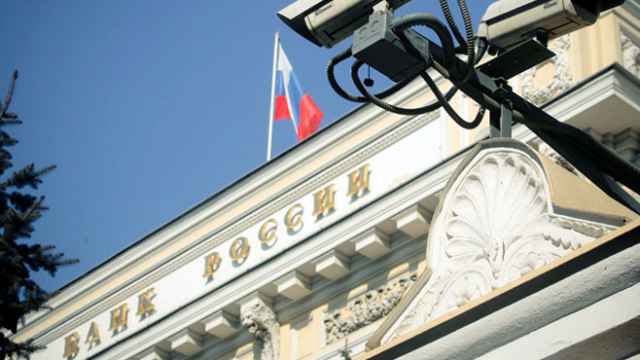The Finance Ministry has proposed weakening currency control over transactions involving Russians’ foreign bank accounts, according to Deputy Finance Minister Alexei Moiseyev. The site www.regulation.gov.ru posted a notice about the draft legislation, although the text of the bill is still in committee.
Violations of currency regulations currently carry a fine of 75 percent of the sum involved for the first offense, and 100 percent thereafter. Transferring the revenue from the sale of shares to a foreign account is among the prohibited operations. A Finance Ministry representative said that only those who spend more than three months of the year in Russia will be considered currency residents. Moiseyev said those who spend fewer than three months in the country will not be obligated to report their foreign accounts to the Federal Tax Service and can claim on the same basis that they are currency non-residents.
The government supported the bill on the repatriation of funds transferred to non-resident accounts. Currently, any Russian citizen who has spent at least one day of the year in the country is considered a currency resident. It is almost impossible to shake that status, EY partner Irina Bykhovskaya said. “People are really complaining. The only way to get rid of currency resident status is to change citizenship,” one federal official said.
The new regulation will be fairer, he said. People will be able to come to Russia to vacation or visit family without having to fear coming under currency control.
The Finance Ministry and Central Bank also propose extending the range of permissible operations involving foreign bank accounts so that Russians can transfer the proceeds from the sale of automobiles and property that are registered in Russia. The 35 members of the Organization for Economic Co-operation and Development (OECD) and the 34 of Financial Action Task Force (FATF) should also have accounts opened in the respective countries.
Russians with foreign bank accounts must submit annual reports to the tax authorities on any accounts they have opened or closed, the number of transactions concluded, their account balances and their income and expenses.
Russian citizens have already reported approximately 120,000 foreign bank accounts, the federal official said.
Russians are prohibited from using their foreign accounts for a range of operations. They cannot transfer income to them from trusts and derivatives, or from the sale of foreign real estate or, until 2018, the sale of securities.
The Federal Tax Service has only limited access to such information at present, but beginning in 2018, tax agents will receive automatic notifications from their counterparts in other countries. For this reason, financial consultants have identified currency risk as a top concern for Russian citizens. A federal official said the authorities will look first for undeclared accounts with large balances, and the Russia tax authorities can request detailed information about those accounts from the pertinent foreign banks.
A two-year statute of limitations applies to currency violations. However, the federal official explained that transactions conducted in 2016 are under no threat of penalty because only the information on account balances for 2017 will become available in 2018. Thus, if the amendments come into effect in 2017, current financial operations carried out by Russians living abroad and income from the sale of property and automobiles are not at risk.
Moiseyev is confident that the new measures will make life easier for many people, and that, while it is necessary to stiffen laws against illegal operations, the government should lighten the burden on legal transactions.
In many countries, it is technically difficult to sell property without transferring those funds into a local account, said Sergei Kalinin, the head of tax practices for Yegorov, Puginsky, Afanasyev & Partners. Sometimes the buyer himself refuses to transfer money onto a Russian account. Such limitations have prompted many people to transfer ownership of automobiles, private airplanes, and yachts to foreign companies in order to avoid, among other things, violating currency regulations, Bykhovskaya said.
Expanding the list of legal operations is useful, PriceWaterhouseCoopers partner Yekaterina Lazorina said, but most people have a problem with the restrictions on income from securities and derivatives. Kalinin agrees that it creates problems for people who actively trade securities on foreign venues because foreign banks cannot transfer money through Russian accounts for certain types of operations, making such transactions impossible for Russian traders. Deloitte senior manager Leonid Pechernikov said that although some foreign banks can transfer money through Russian accounts, they are probably the exception.
Lazorina said that the situation would not improve unless the authorities further ease controls on people working in financial markets. Pechernikov agreed that, even with the Finance Ministry proposals, most operations remain risky and that leaders need to further extend the list of operations not falling under strict controls. Kalinin said the best policy would be to directly link tax and currency residency, and that individuals should provide account information so that government agencies can check accounts data against their tax declarations.
A Message from The Moscow Times:
Dear readers,
We are facing unprecedented challenges. Russia's Prosecutor General's Office has designated The Moscow Times as an "undesirable" organization, criminalizing our work and putting our staff at risk of prosecution. This follows our earlier unjust labeling as a "foreign agent."
These actions are direct attempts to silence independent journalism in Russia. The authorities claim our work "discredits the decisions of the Russian leadership." We see things differently: we strive to provide accurate, unbiased reporting on Russia.
We, the journalists of The Moscow Times, refuse to be silenced. But to continue our work, we need your help.
Your support, no matter how small, makes a world of difference. If you can, please support us monthly starting from just $2. It's quick to set up, and every contribution makes a significant impact.
By supporting The Moscow Times, you're defending open, independent journalism in the face of repression. Thank you for standing with us.
Remind me later.






